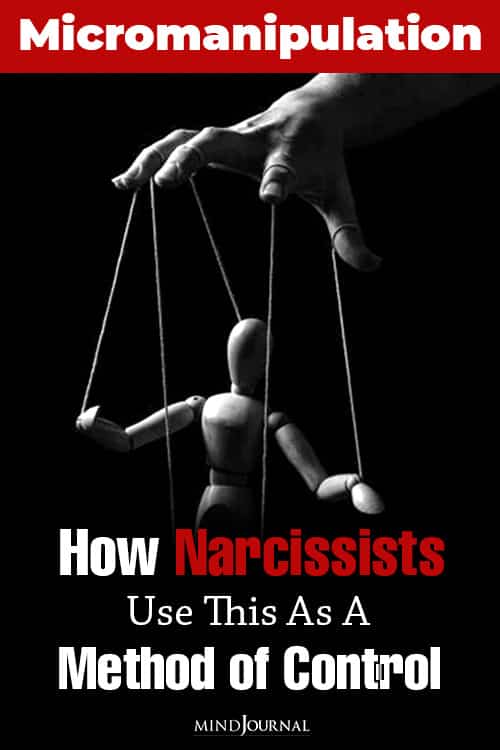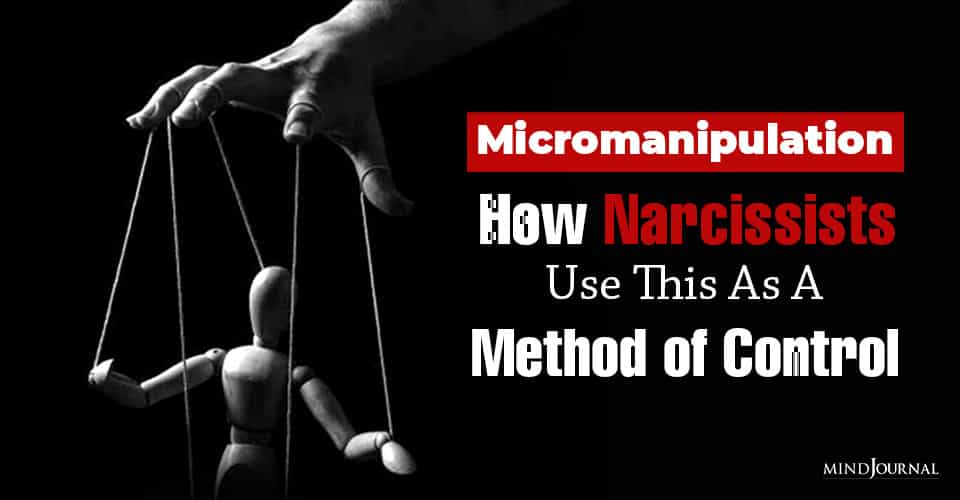A Method of Control: When manipulation is not enough for narcissists to abuse and trick their victims, they turn to micromanipulations. And sadly, sometimes this works even better than the former when it comes to tricking their victims to believe what they are being brainwashed to believe.
Manipulation is one of the most reliable behaviors of a narcissist. Whether someone is a full-blown diagnosed narcissist or just displays some of the traits, manipulation is a key tactic of achieving an end goal. In some cases, manipulation is easy to identify and can be avoided or ignored; take, for example, a pushy salesperson or even politicians and CEOs. However, manipulation tends to be much more covert when coming from a personally loved and trusted individual.
With love comes vulnerability. In the right hands, our insecurities and self-doubts are safe and respected. But in the hands of a manipulative individual, our kindness and love are taken for granted and twisted into exploitation. Manipulation can be direct or covert; regardless of the style, the intention is to control and hurt.
The Psychological Harassment Information Association describes manipulation as when the abuser is using personal, private, and sensitive information to destabilize the victim (2010). The purpose behind this is ideation, or that the victim is being led to believe something false for the manipulator to gain—or re-gain—control.
Both direct and indirect manipulations are used to keep an individual close and attached. The exaggerated and dramatic tales are meant to maintain attention that may be slipping. It is important to understand that these tactics are not due to the manipulator loving you and wanting you to stay; rather, it is because your love, attention, and attachment are beginning to fray.
Think of a relationship between a narcissist and her partner as a rope. The rope used to be coated in something attractive and comforting and soothing; it was coercive enough to entrap the individual into thinking the possession was love. As the relationship lengthened, the rope got tighter and more in control of the manipulator.
Related: Manipulation Of The Charming Narcissist
But as the rope’s tension increased, the warm and deceitful covering began to wear off and the rope itself began to chafe and burn against the victim. Manipulations are used as an effort to recover the rope in its sheath and keep it from snapping, thus setting the victim free.
Narcissists cannot accept the fact that another person does not want to be with them or even goes as far as rejecting the narcissist. Remember that a key trait of narcissists is an overblown, undeserved ego, and an inner belief that people are jealous of them. To them, it is simply not possible that their partner doesn’t love them and can live happily without them.
If the narcissist loses the attention and affirmations of just one individual that was previously well-controlled, they will go to extreme lengths to regain that control through manipulation.
Some methods of manipulation are direct, brash, and used to incite empathy from the victim. These individuals will not think twice about threatening suicide or even claiming to have a plan for their suicide. The purpose of this is to awaken the caretaker trait in the abused partner and keep them close.
“My ex threatened suicide many times during our three-year relationship,” says one former victim from metro New York. “Any time I attempted to leave the relationship, or he felt I wasn’t catering to him enough or caring enough, he would go on a monologue about how he was going to die because no one cared.
“He claimed to even have a plan, and that he attempted it once, but he lived. At first, the threats worked, and I yielded and stayed. But finally, I realized it was just a ploy to keep me close. He never got help, never went to a doctor or counselor. We’ve been broken up for a year and he’s still alive.”
Suicide is a direct and scary tool used by manipulators, but its effect can be avoided when the partner recognizes it as a mere tool, not a reality, and then create boundaries. Suicide is not a threat to take lightly; but if the individual refuses help, there is not much more a friend or partner can do.
Self-respecting boundaries, such as stating, “I understand you are upset, and I will support you in getting help, but you cannot direct threats at me or make me stay with you to keep you from harming yourself” will allow the abused partner to maintain their distance and their individuality.
Want to know more about narcissists and their micromanipulations? Check this video out below:
If direct manipulation tactics aren’t working, narcissists may turn to what’s known as micromanipulations. These are similar to indirect and covert manipulations, but micromanipulations are more geared towards sympathy and empathy of their partner and their own self-perceived victim status. Micromanipulations are intentional ways of redirecting the narrative and regaining control over the other person’s thoughts and feelings.
These brief comments are made in passing or casual conversation meant to hit heavy and unexpectedly and require the victim to go back to the manipulator for clarification. This form of psychological abuse is far more dangerous because it creates the sweetest smelling situation that the victim almost willingly walks right back into.
Dani from New England says, “My former partner would consistently send messages that supposedly weren’t meant for me, and then she would say ‘whoops, sorry, sent that to the wrong person’. Or she would send and then unsend a message and all I would see is, ‘Jane unsent a message.’ The first few times I fell for it and would ask her what she wanted or what was the problem, and it would turn into a full conversation. A friend finally told me I was giving my ex what she wanted: attention.”
One individual from the Southern United States is currently entrenched in a difficult divorce due to actions by his narcissistic ex-partner. He is finally dating other people but that doesn’t stop his ex from attempting to micromanipulate him. She buries little nuggets of heavy topics into light conversations about their children or holidays.
For example, she recently commented offhand about an upcoming doctor appointment and that she should be on time for picking up the kids if the visit didn’t turn into extra tests due to cancer or complications.
A narcissist could very easily say, “I have an appointment that may run late” instead of elaborating about cancer threats. The purposeful insertion of unexpected information—whether real or fabricated—is intended to shock the former partner, extract sympathy and support, and eventually retighten the ropes that have become slack.
Related: 15 Lies A Narcissist Says To Keep You Around
The victim role can be very useful for a narcissistic manipulator that is attempting to win back an empathetic former partner.
Some victims are so entrenched in their abuser that they accept the manipulations as fact and stay in the situation. Others start listening to the little voice that questions these tales and threats. All manipulations are focused on preying on the victim’s fears, doubts, and guilt (Shortsleeve, 2018). A narcissist never wants a partner for love, support, and friendship; the purpose of every relationship is to merely fulfill one’s own wants and demands.
There is a certain strength and self-respect that comes when an individual refuses to accept the lies they are being fed and start looking for the truth. Breaking free of the manipulative ropes used by narcissists isn’t easy, but freedom is always worth the effort and pain.
References:
Psychological Harassment Information Association. (2010). Retrieved from psychologicalharassment.com
Shortsleeve, C. (2018). How to tell if someone is manipulating you - and what to do about it. Time. Retrieved from time.com/5411624/how-to-tell-if-being-manipulated
Written By Kristy Lee Hochenberger Originally Published In Psychology Today
Micromanipulations is the weapon that narcissists have in their arsenal, and bring it out when they see that their toxic games are probably not working on their victims, or when THEY want to seem like the victim in the situation. Now that you know how narcissists use micromanipulations to carry out their dirty tricks, be careful not to fall for them. Don’t accept their lies, and see how they unravel.










Leave a Reply